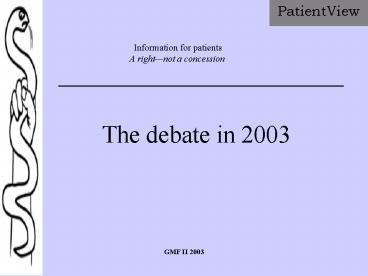Information for patients - PowerPoint PPT Presentation
1 / 8
Title:
Information for patients
Description:
... and self-determinism. Managing lifestyle, self-monitoring. A ... To improve compliance, self-determinism and clinical outlook. A right--not a concession ... – PowerPoint PPT presentation
Number of Views:35
Avg rating:3.0/5.0
Title: Information for patients
1
PatientView
Information for patients A rightnot a
concession
The debate in 2003
2
Patients want more information Consider patients
with cancer
From the 2002 PatientView survey of 11 major
cancer groups (countries represented Austria,
Finland, Germany, Italy 2, Portugal 2, and
the UK 4, representing up to 1,300 patient
organisations, and up to 2.6m cancer patients)
- Patients with cancer get information on their
condition and treatments from multiple sources,
not just from doctors - ? Few cancer patients get most of their
information from printed matter (including PPLs) - ? Four of the 11 patient group respondents
stated that they did not always trust the
information on prescription medicines supplied to
them by doctors
3
Patients want more information Consider patients
with cancer
Important areas where cancer patients need more
information of respondents that said
yes ------------------------------------------
------- Article in CancerFutures, February
2003, vol 2, pages 33-35
Source PatientView, 2003
4
Patients want more information Consider patients
with cancer
In a study of 1,000 Munich-based women with
breast cancer ? Nearly 50 regarded the
information they received as incomprehensible or
incomplete ? Over 50 wanted more opportunity to
talk to medical staff Communication, quality
of life and age results of a five-year
prospective study in breast cancer patients,
Annals of Oncology, February 2003, vol 14, no 3,
pages 421-427
5
Patients want more information Consider patients
with cancer
In a study of 2,850 patients in the UK suffering
from terminal cancer ? The overwhelming
majority wanted to be given as much information
as possible, regardless of whether the news was
god or bad ? According to Professor Lesley
Fallowfield (University of Sussex, and an author
of the study) They doctors often
underestimate the information needs of their
patients, and may censor the information in the
belief they are being kind. Truth may hurt
but deceit hurts more communication in
palliative care , Palliative Medicine, July
2002, volume 16, issue 4.
6
All patients want more information
- Two-thirds of all patients group respondents to
PatientViews 2002 EU-wide survey agreed with the
statement that patients should have access to the
same information on prescription medicines as the
doctor. - Should pharmaceutical companies provide the
public with more information on prescription
medicines? The views of EU-based patient groups, - PatientView, June 2002, ISBN 1-904394-01-9
Number and percentage of respondents who agreed,
possibly agreed or did not agree with the
-
following statement In a patient-centred
healthcare system, members of the public should
not
be denied the information already received by
doctors
Yes
Possibly/
No
Don't
it depends
know
Number of respondents
89
35
9
3
of respondents
65
26
7
2
Source PatientView, 2002
Vienna, Media Workshop March 20th 2003
7
? True meaning to informed consent Understanding
diagnosis, choice of treatment, nature of
side-effects? In the face of rationing,
individual involvement in decision-making Sa
tisfaction with choice of treatment, this
transparency will eventually improve access to
treatment ? Education and self-determinism M
anaging lifestyle, self-monitoring? A
doctor-patient partnership To improve
compliance, self-determinism and clinical
outlook? A right--not a concession
All patients want more information Why they want
it
8
All patients want more information Effecting
change
- In July 2001, the Commission proposed a pilot
study to permit - pharmaceutical companies to supply consumers
with Internet-based information - on prescription medicines in the
areas of HIV, asthma and diabetes. - On October 23rd 2002, MEPs rejected
the proposal, but acknowledged - (for the first time) that
patients have a right to information - Since then
- Patient groups have lobbied for change European
Federation of Neurological Associations (EFNA)
Active Citizenship - New umbrella groups have formed European
Patients Forum (EPF) - New response from academics the Informed
Patient Project (Judge Institute of Management,
University of Cambridge) - New research by PatientView, among others

